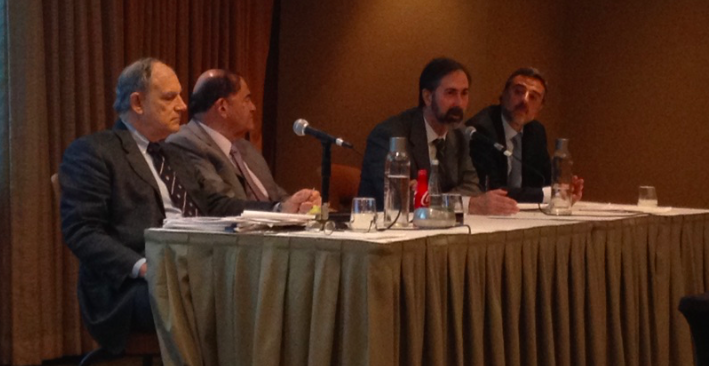The pressure on Wealth Management is increasing at such a rate- due to the dynamism of national and international authorities, and the various agreements between countries which are incessantly enforced- that David Schwartz, President of FIBA (Florida International Bankers Association) states that “the industry is at a crossroads.”
The regulatory scenario is by no means easy for Wealth Management companies, be they large or small. The rising costs of expanding compliance teams are challenging business profitability, and customer privacy seems to have disappeared from the playing field.”Has privacy been lost forever? It could have. We are in a new world,” says Jon Grouf, partner at the New York based company, Duane Morris, which boasts over 700 legal professionals.
Schwartz and Grouf, together with Bruce Zagaris, a partner at law boutique Berliner Corcoran & Rowe of Washington, took part at a round table on the regulation of the industry, which was organized by Citco Corporate Services and in which their Regional Manager for Latin America, Ernesto Mairhofer, acted as moderator.
The situation has become extremely complicated in recent years. On the one hand, the United States introduced FATCA and its “IGA” (intergovernmental agreements), which depending on the model signed, means either a unilateral or a bilateral exchange. Subsequently, GATCA– its equivalent, albeit with some differences- was introduced in the UK. And now, the CRS (Common Reporting Standard) of the OECD will in practice begin to operate in some countries from January 1 st, 2016, although the initial exchange will not take place until 2017.
Since the aforementioned OECD agreement for the automatic exchange of information must be transferred by the different jurisdictions into their local regulations, we’ll no doubt still see the birth of new legislation in many of the participating countries, between which, there are remarkable differences in the level of its enforcement.
But what, in addition to the costs and proper compliance of these rules, is worrying the institutions, according to the Berliner Corcoran & Rowe partner, are reductions in the privacy rights of the asset holders, which in regions such as Latin America, are key -for reasons of the clients’ security and even physical safety-. In addition to the new regulations, these reductions are also the result of the increased activity of whistleblowers (accusers who are not always within the framework of the law), the growing importance of investigation journalism, which has given rise to a consortium of over 190 journalists from 65 countries, or leaks (as the famous case of Wikileaks, which made some people leave their country for security reasons). “We should lobby more for taxpayers´ rights. We should not be afraid to demand more rights,” he says.
“Previously, hardly anyone wondered about ownership of assets under a corporate name, but currently we are seeking out the final owner” says Jon Grouf. The multi jurisdictional structures used so far could change their attributes depending on the countries involved and the agreements between them. “This new regulation will have a big impact in many countries, though perhaps not so in the United States.” Everything will depend on whether the country is considered as “a participant or not,” because regulators are reluctant to join CRS wielding the existence of FATCA as reason.
Large fortunes, and especially their advisors, will have to, like it or not, invest in lawyers and experts to help them comply with international law as well as with their clients’ wishes, and all players within the Wealth Management sector who wish to continue operating, will have to do so in order to avoid legal implications and reputational damage.
All these changes in international rules and regulations are prompting many countries to offer taxpayers who did not meet their tax obligations on time the opportunity to do so now, through regulations or amnesties. In this regard, Grouf reminds us that Chile has a voluntary disclosure program at 8%, United States at 27.5%, Brazil is currently discussing something similar in parliament but with a higher rate of around 30%, and this year Colombia announced 16 % until 2017. We also have Mexico with a voluntary disclosure program, and Argentina, whose program has had little success, is expecting a more attractive one.
Where is this leading us? “There may be entities which are increasingly unwilling to accept foreign funds,” said the Duane Morris partner. The president of the International Bankers Association of Florida does not hesitate to describe the current situation as “over-regulation“, does not harbor hopes of relaxation by the authorities, and encourages the industry to state their opinion, while he points out that “the risk has already influenced the industry. We are already seeing banks which reduce their risk by leaving whole jurisdictions,” and he recognizes that at any given moment, “we did expect the death of Miami as a financial center, but the overall escalation of regulation has eliminated the disadvantage of our place, and money is returning to Miami. Until when? We do not know, but we must seize the moment.”
To which Ernesto Mairhofer of Citco, adds “There is life after FATCA and CRS, it will undoubtedly be different, but high income families will continue to have the same needs which they do today: orderly estate planning, cross border issues (for e.g. children living in different countries), insecurity in their countries of residence, avoiding fictitious profits from the devaluation of their currencies, etc.”
